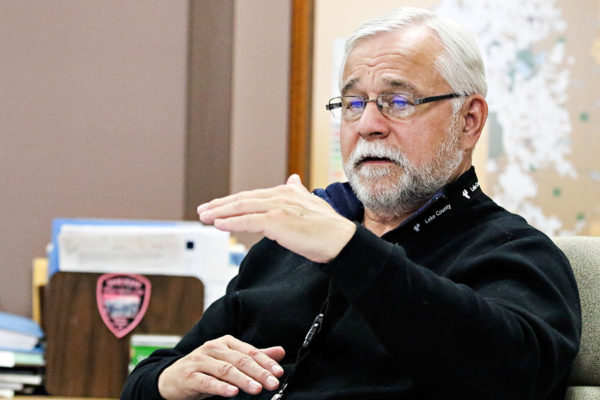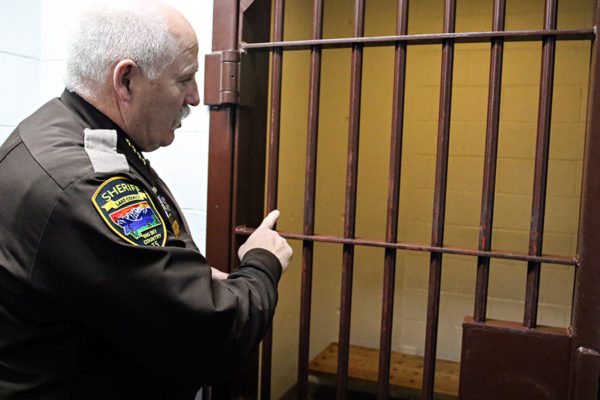Amid Declining Tax Revenues, Lake County Reconsiders Reservation Authority
County commission wants to stop prosecuting tribal members to save money, but critics worry some crimes could fall through the cracks
By Justin Franz
Since the 1960s, the Flathead Indian Reservation has been unique in Montana in that any tribal member accused of a felony is tried within the local district court system instead of by the federal government.
Sanctioned under a federal statute called Public Law 280, the agreement between the state and the Confederated Salish and Kootenai Tribes to prosecute tribal members in Lake County District Court has been lauded as a success by local law enforcement agencies for years. But now a debate is brewing over who should pay for it.
In January, the Lake County Commission passed a resolution of intent to withdraw from Public Law 280 and instead have the federal government prosecute tribal members on the Flathead Reservation, just like it is done on all of Montana’s other reservations. Misdemeanors would remain in tribal court, where they’ve been prosecuted since the early 1990s.
The commission’s three members said that while the agreement has been good for the tribe and the county, they believe Lake County taxpayers can no longer foot the bill. Unless the state or federal government starts helping cover costs, the county wants out.

“I think it’s fair to say that everyone would like to keep the system we have now, but Lake County simply does not have the money to maintain it,” said Commissioner Bill Barron.
The tribe at the center of the debate hasn’t officially taken a stance yet.
“The council is still evaluating all the facts and looking at what’s best for everyone,” CSKT spokesperson Rob McDonald told the Beacon.
According Lake County Attorney Steven Eschenbacher, two-thirds of the felony cases his office deals with involve tribal members. The commission said approximately half of the local jail population is made up of tribal members and that the county spends more than $2 million annually prosecuting and jailing accused tribal members.
That cost is steep in an era of declining tax revenues in Lake County following the sale of the former Kerr Dam to the tribe. County Commissioner Gale Decker said the dam used to produce $2 million annually in tax revenue, more than a quarter of which went into the general fund. Now the dam generates no revenue for the local government.
“The sale of the Kerr Dam is what tipped this off,” he said. “When $2 million in tax dollars walks out the door with the sale of the dam, that’s going to have a huge impact on the budget.”
The commission said if the county no longer has to prosecute tribal members under Public Law 280, it could cut costs at the often over-crowded jail, the court and the county attorney’s office.
But backing out of the agreement isn’t easy. In fact, Lake County has little say in the matter because the agreement is between the state and the tribe. State officials and the Department of Interior would have to give approval first before the county could stop prosecuting felonies.
In hopes of avoiding that, Rep. Greg Hertz, R-Polson, introduced a bill in Helena this session that would require Montana to pay the county for prosecuting tribal members.
“This is an unfunded mandate from the state and federal governments that has been pushed on to the taxpayers of Lake County, and they can no longer afford that,” Hertz said.
The Lake County Commission said that the resolution passed in January was an effort to help Hertz and let the Legislature know they are serious about backing out of the agreement. But the bill was tabled last week.
Not everyone in Lake County is in support of backing out of Public Law 280, most notably its top lawman. Sheriff Don Bell said he understands the commission’s concern about costs but thinks there are risks to ditching the current system. If the Federal Bureau of Investigation and Bureau of Indian Affairs took over all major crime investigations on the reservation, Bell worries that some cases would “fall through the cracks” and that investigators from outside the community would not be as committed as his deputies.

“I have friends and family here, and that’s the same for all my deputies,” Bell said. “We have a vested interest in this community, whereas an FBI agent from Kalispell, Great Falls or Missoula is going back to their own community at the end of the day.”
Bell also said that there would be little savings within his department should the county stop prosecuting tribal members because his deputies would still respond to all calls.
If Lake County did cease prosecuting tribal members, federal prosecutors stand ready to take over, according to U.S. Attorney for the District of Montana Michael Cotter. He said that even after Montana and the CSKT entered into the agreement in the 1960s, the federal government never lost its jurisdiction on the Flathead Indian Reservation.
“We have concurrent jurisdiction and we would be able to step in and start prosecuting crimes immediately,” he said.
Cotter brushed off concerns that federal prosecutors would let some crimes fall through the cracks, and noted that on other reservations, his attorneys work closely with tribal attorneys to ensure every crime is prosecuted to the fullest extent of the law. While the CSKT tribal court only handles misdemeanors now, it could also start trying felony cases with federal approval. One criticism of tribal courts, however, is that by law they can only sentence a defendant to three years in jail or up to nine years if there are three charges.
Commissioner Barron, who previously was sheriff in Lake County and spent part of his career in law enforcement in Glacier County on the Blackfeet Indian Reservation, said he has worked with and without Public Law 280, and if he had to choose, he would pick the former if it was financially feasible.
Decker, who voted to back the resolution vowing to leave Public Law 280, has concerns about transferring prosecutorial power to the federal government but sees no other way to balance the county books.
“When the federal government gets involved, things don’t always get better,” Decker said.